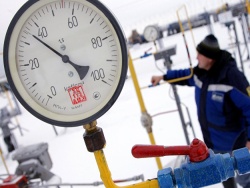Prime Minister Dmitry Medvedev said that the share of revenues from the sale of oil and gas in Russia’s budget is gradually declining owing to the economic policy of the authorities, and now more than half of the money in the Treasury received from other sources. Medvedev says this is not the first time — and many politicians echo his words. Medusa in my new category Factcheck checked how true the words of the Prime Minister, and found that he’s right only 33%.
Quote:
Step by step we are making this [structural changes in the economy]. More recently, we have revenue from hydrocarbons accounted for approximately 70% of the revenues of the state budget. We are specifically sitting on this needle. Then there was about 55% and now 45% .
Factcheck:
✔ The share of budget revenues from hydrocarbon exports for a short time significantly decreased
It’s true. In the past year, actually recorded a significant decline of the share of oil and gas revenues in the Federal budget.
✘ The decline in recent years was sustained
It is not true. During the reign of presidents Putin and Medvedev, the share of oil and gas revenues in the Federal budget several times changed significantly: both in big, and in smaller parties.

Source: the Federal Treasury of Russia; Ministry of Finance; government of Russia
✘ The decline in the share of oil and gas revenues became possible thanks to the purposeful policy of the government
It is not true. The decline largely occurred from beyond the control of the officials of circumstances. Back in 2007, when oil and gas revenues have been separately accounted for in the budget, the Ministry of economic development called the decline in the share of oil and gas revenues an important long-term factor. Since then, the government in each three-year budget forecast a reduction of this share, calling the same causes: the decline in hydrocarbon prices, reduced production and low export growth of oil and gas, as well as a small growth rate of the U.S. dollar (relative to GDP growth). In the explanatory note of budget 2016, is said about the attempt of the government not to decrease but increase (!) the share of oil and gas revenues through changes in tax legislation.
✘ More recently, the share of oil and gas revenues accounted for approximately 70% of budget revenues
It is not true. If you take the period 2000 to 2015, the share of oil and gas revenues have never reached 70%.
✘ The share of oil and gas revenues reached 55%
It is not true. The maximum value of which reached the share of oil and gas revenues in the budget of 51.3%. This happened in 2014.
✔ Now oil and gas revenues make up 45% of the income of the Federal budget
It’s true. According to preliminary estimates for 2015, the share of oil and gas revenues accounted for 44.4%. In the 2016 budget, set the percentage at 44%.
Total:
The statement of Dmitry Medvedev about the share of oil and gas incomes of the budget can be divided into six points. Of these, the truth turned out to be two. Thus, the statement is true for 33.3%.
Note. We looked at the Federal budget, and not consolidated (that is, together with the budgets of the regions), because the government directly is responsible for the Federal budget. Oil and gas revenues in the budget the government itself about ten years ago identified as a separate group. They form from the mineral extraction tax (tax on mineral extraction) in oil, gas, gas condensate and export duties of crude oil, natural gas and products from oil.








